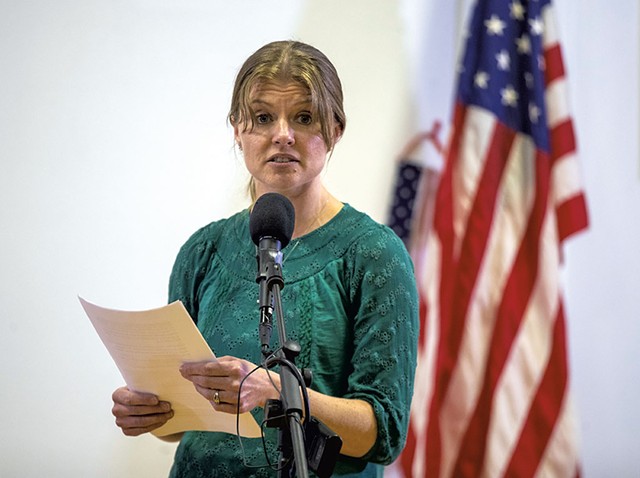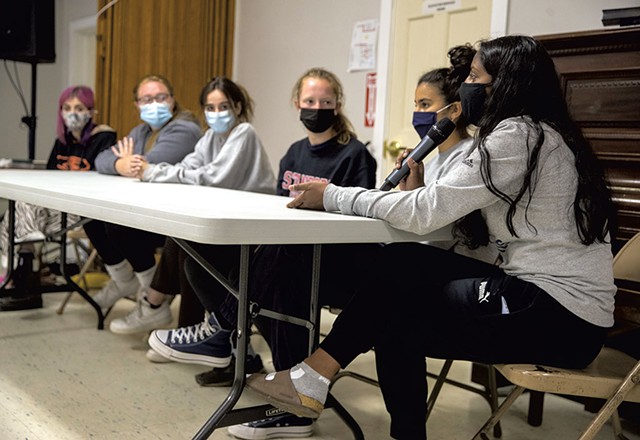After weeks of fervent debate, the Essex Westford School Board voted 8-1 on Tuesday night to approve a district equity policy.
In an emotionally charged Zoom meeting attended by around 150 people, board members reviewed revisions to the policy made in the past several weeks and asked questions of Superintendent Beth Cobb and Erin Maguire, the district’s director of equity and inclusion.
The policy, which the district’s 12 principals endorsed, lists 13 “indicators” that will show it is working, including a more diverse curriculum and staff; mandatory staff training around bias, stereotypes and equity; and teaching about the past in a way that dismantles “revisionist frameworks that perpetuate inaccurate portrayals of people in privileged and subjugated positions.”
Board chair Kim Gleason launched Tuesday’s discussion by stating that the policy was the result of nine months of work by the school district and incorporated feedback from hundreds of community members. It was written by a group of 20 community members who identify as Black, Indigenous or people of color.
“The people who crafted the language of this policy did so through the lens of their lived experiences, being marginalized, underserved or underrepresented in the [school district],” Gleason said.

- James Buck
- Liz Cady speaking at an event last month
Over the past month, hundreds of community members expressed wide-ranging opinions about the policy. Supporters said it would foster critical thinking and lead to high standards for all students. Detractors, meanwhile, called it divisive and unpatriotic and said it would make white students feel guilt and students of color feel like victims.
Some equated the policy with critical race theory, an academic framework that asserts that racism is built into institutions such as schools. In recent months, Republican governors and legislatures across the country have attacked the theory and conflated it with equity teachings in schools. Florida, Iowa, Texas, Tennessee and other states have advanced or enacted legislation banning antiracism training or instruction that mentions white privilege, antiracism or critical race theory in schools.
Board member Liz Cady, an outspoken critic of the district's equity work, was the sole “no” vote. She called the vote rushed and said that people who were concerned about the policy were not listened to. She also questioned the lengthy glossary attached to the policy that defines terms including “oppression,” “non-dominant culture,” “stereotypes” and “bias.”
“The glossary is as long as the policy,” Cady said. “How can we have a policy like this? It’s confusing … In fact, I’m not even certain it’s a policy at all.”
Cady also took issue with the fact that staff training around bias, stereotypes and equity was mandatory under the policy.
“Have all of our teachers signed new contracts agreeing to this mandatory training?” she asked. “My concern is that we have put it in a place where our teachers and educators cannot express any concerns for fear of losing their jobs.”
Maguire, the director of equity and inclusion, said the expectation is that staff in the school district will comply with the policies passed by the school board.
When several board members voiced concern about some of the more recent changes to the policy, board member Diane Clemens expressed her anger about getting sidetracked.
"I really wanted this policy ready for us to go in August," she said. "Some of these questions should have been forwarded to Erin [Maguire] a while ago, and I'm pissed off at you guys."
Board member Erin Knox said that neighboring South Burlington and Champlain Valley school districts have recently taken steps to prioritize equity.
“This is crucial to what we need to do to move forward,” Knox said. “If we can teach our students to learn from the good, the bad and the ugly … I think that’s wonderful for all of us.”

- James Buck
- Essex Westford students speaking at an anti-racism event last month
Before the vote, board member Brendan Kinney shared an impassioned statement. In his 13 years doing board work, he said he had never seen so much community engagement around a policy decision. Kinney thanked those who opposed the equity policy for helping him to think more deeply about the district’s equity work.
He also called out a “smaller subset of people” opposed to the district’s equity work who he said were “part of a national, political and partisan movement with the ultimate goal of undermining the institution of public education.”
“To this group, I have a different message,” he said. “Shame on you. Shame on you for using the children of our community for pawns in your culture war.”
“Historically the work of school boards has been apolitical. Yet in recent months, we’ve seen partisan tactics being used to promote a political agenda,” Kinney continued. “They spread misinformation, they take and twist comments out of context, they use false equivalence in making their arguments, and they deploy scare tactics to confuse parents and taxpayers.”
In addition to the decision the board had to make about the equity policy, Kinney said, the Essex Westford community has a more critical decision to make going forward.
“Will we face off as enemies or will we move forward together as neighbors?” he asked. “I know my choice.”




















Comments
Comments are closed.
From 2014-2020, Seven Days allowed readers to comment on all stories posted on our website. While we've appreciated the suggestions and insights, right now Seven Days is prioritizing our core mission — producing high-quality, responsible local journalism — over moderating online debates between readers.
To criticize, correct or praise our reporting, please send us a letter to the editor or send us a tip. We’ll check it out and report the results.
Online comments may return when we have better tech tools for managing them. Thanks for reading.